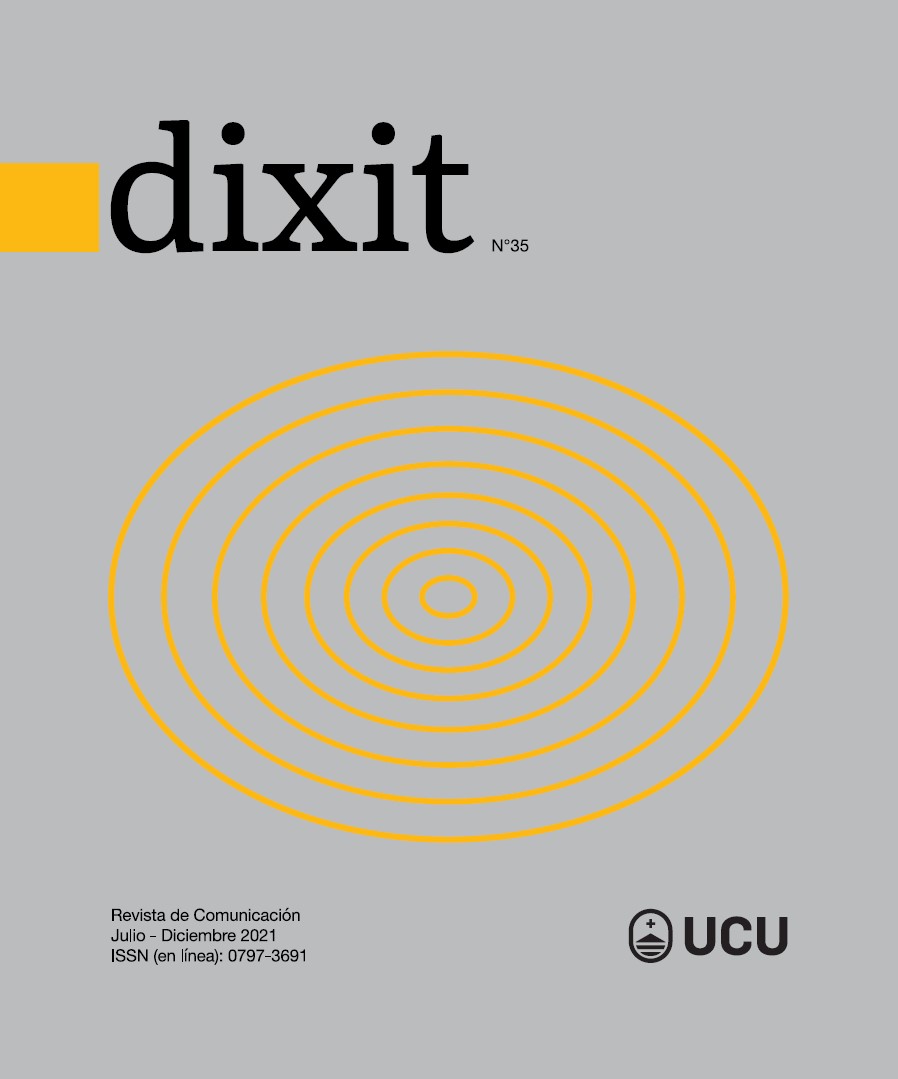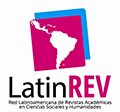Interacciones digitales en un contexto transnacional: Prácticas comunicativas de estudiantes internacionales en Barcelona
DOI:
https://doi.org/10.22235/d35.2471Palavras-chave:
tecnologías digitales, interacciones mediadas, estudiantes internacionales, migración digitalResumo
Este artículo tiene como objetivo describir de qué forma se produce la experiencia digital de socialización —entendida como la interacción mediante redes sociales— por parte de estudiantes universitarios internacionales en Barcelona, España, durante sus periodos de movilidad. Con base en una revisión de la literatura, que aborda conceptos como el de polymedia o copresencia, y a través de un enfoque de corte etnográfico, el estudio describe —en términos como su distribución y disposición o su impacto en la nostalgia que los jóvenes puedan padecer— las interacciones digitales que los estudiantes internacionales sostienen tanto con sus entornos de procedencia como con aquellos que han conocido en el sitio de acogida. Las conclusiones apuntan a que las interacciones digitales contribuyen a reducir el impacto de la separación física y emocional que los estudiantes experimentan al vivir temporalmente en otro país.
Downloads
Referências
Baldassar, L. (2016). De‐demonizing distance in mobile family lives: co‐presence, care circulation and polymedia as vibrant matter. Global Networks, 16(2), 145-163. https://doi.org/10.1111/glob.12109
Bacigalupe, G., y Bräuninger, I. (2017). Emerging technologies and family communication: The case of international students. Contemporary Family Therapy, 39(4), 289-300. https://doi.org/10.1007/s10591-017-9437-7.
Beneito-Montagut, R. (2011). Ethnography goes online: towards a user-centred methodology to research interpersonal communication on the internet. Qualitative Research, 11(6), 716–735. https://doi.org/10.1177/1468794111413368.
Bermúdez, R. (2015). La movilidad internacional por razones de estudio: Geografía de un fenómeno global. Migraciones Internacionales, 8(1), 95-125.
Burchell, K. (2017). Everyday communication management and perceptions of use: How media users limit and shape their social world. Convergence: The International Journal of Research into New Media Technologies, 23(4), 409-424. https://doi.org/10.1177/1354856517700382
Cairns, D. (ed.). (2010). Youth on the Move. European Youth and Geographical Mobility. VS Verlag für Sozialwissenschaften.
Cefai, S., y Couldry, N. (2017). Mediating the presence of others: Reconceptualising co-presence as mediated intimacy. European Journal of Cultural Studies, 22(3), 291-308. https://doi.org/10.1177/1367549417743040
Dekker, R., y Engbersen, G. (2014). How social media transform migrant networks and facilitate migration. Global Networks, 14(4), 401-418. https://doi.org/10.1111/glob.12040
Feixa, C. (2014). De la Generación@ a la #Generación: La juventud en la era digital. Nuevos Emprendimientos Editoriales.
Fernández, S., y Ruzo, E. (2004). Los procesos de internacionalización y globalización en la educación superior: un análisis de los países de la OCDE. Revista de Educación, 335. 385-413.
Hammersley, M., y Atkinson, P. (1983). Ethnography: Principles in practice. Tavistock.
Hinton, S., y Hjorth, L. (2013). Understanding Social Media. SAGE.
Hjorth, L. (2005). Locating Mobility: Practices of co-presence and the persistence of the postal metaphor in SMS/MMS mobile phone customization in Melbourne. Fibreculture Journal, 6. http://six.fibreculturejournal.org/fcj-035-locating-mobility-practices-of-co-presence-and-the-persistence-of-the-postal-metaphor-in-sms-mms-mobile-phone-customization-in-melbourne/
Hofer, B., Thebodo, S., Meredith, K., Kaslow, Z., y Saunders, A. (2016). The long arm of the digital Tether: Communication with home during study abroad. Frontiers: The Interdisciplinary Journal of Study Abroad, 28, 24-41.
Hua, P. (2018). Understanding the effects of WeChat on perceived social capital and psychological well-being among Chinese international college students in Germany. Aslib Journal of Information Management, 70(3), 288-304. doi: 10.1108/AJIM-01-2018-0003
Kang, T. (2012). Gendered media, changing intimacy: Internet-mediated transnational communication in the family sphere. Media, Culture & Society, 34(2), 146-161. https://doi.org/10.1177/0163443711430755
King, R. (2002). Towards a new map of European migration. International Journal of Population Geography, 8(2), 89-106. https://doi.org/10.1002/ijpg.246
Lambert, A. (2016). Intimacy and social capital on Facebook: Beyond the psychological perspective. New Media & Society, 18(11), 2559-2575. https://doi.org/10.1177/1461444815588902
Li, L., y Peng, W. (2019). Transitioning through social media: International students’ SNS use, perceived social support, and acculturative stress. Computers in Human Behavior, 98(1), 69-79. https://doi.org/10.1016/j.chb.2019.03.011
Licoppe, C. (2004). ‘Connected’ presence: The emergence of a new repertoire for managing social relationships in a changing communication technoscape. Environment and Planning D: Society and Space, 22(1), 135-156. https://doi.org/10.1068/d323t
Madianou, M. (2016). Ambient co‐presence: transnational family practices in polymedia environments. Global Networks, 16(2), 183-201. https://doi.org/10.1111/glob.12105
Madianou, M., y Miller, D. (2012b). Polymedia: Towards a new theory of digital media in interpersonal communication. International Journal of Cultural Studies, 16(2), 169–187. https://doi.org/10.1177/1367877912452486
Martin, F., y Rizvi, F. (2014). Making Melbourne: Digital connectivity and international students’ experience of locality. Media, Culture & Society, 36(7), 1016-1031. https://doi.org/10.1177/0163443714541223
Meyrowitz, J. (1985). No Sense of Place: The Impact of Electronic Media on Social Behavior. Oxford University Press.
Miller, D., Costa, E., Haynes, N., McDonald, T., Nicolescu, R., Sinanan, J., Spyer, J., Venkatraman, S., y Wang, X. (2016). How the World Changed Social Media. UCL Press.
Ng, N., Haslam, S., Haslam, C., y Cruwys, T. (2018). “How can you make friends if you don't know who you are?” A qualitative examination of international students' experience informed by the Social Identity Model of Identity Change. Journal of Community & Applied Social Psychology, 28(3), 169-187. https://doi.org/10.1002/casp.2349
Organización de las Naciones Unidas. (s.f.). Juventud. Recuperado de: https://www.un.org/es/sections/issues-depth/youth-0/index.html
Peng, Y. (2016). Student migration and polymedia: Mainland Chinese students’ communication media use in Hong Kong. Journal of Ethnic and Migration Studies, 42(14), 2385-2403. https://doi.org/10.1080/1369183X.2016.1194743
Pink, S., y Morgan, J. (2013). Short-Term ethnography: Intense routes to knowing. Symbolic Interaction, 36(3), 351–361. https://doi.org/10.1002/SYMB.66
Rodríguez, C., Herrera, L., Quiles, O., y Álvarez, J. (2008). El valor familia en estudiantes universitarios de España: análisis y clasificación. Enseñanza e Investigación en Psicología, 13(2), 215-230.
Schrooten, M. (2012). Moving ethnography online: researching Brazilian migrants' online togetherness. Ethnic and Racial Studies, 35(10), 1794-1809. https://doi.org/10.1080/01419870.2012.659271
Scolari, C. (ed.). (2018). Adolescentes, medios de comunicación y culturas colaborativas. Aprovechando las competencias transmedia de los jóvenes en el aula. Transliteracy H2020 Research and Innovation Actions.
Shane-Simpson, C., Manago, A., Gaggi, N., y Gillespie-Lynch, K. (2018). Why do college students prefer Facebook, Twitter, or Instagram? Site affordances, tensions between privacy and self-expression, and implications for social capital. Computers in Human Behavior, 86, 276-288. doi: 10.1016/j.chb.2018.04.041
Vertovec, S. (2007). Super-diversity and its Implications. Ethnic and Racial Studies, 30(6), 1024–54. https://doi.org/10.1080/01419870701599465
Yang, C. (2016). Social media as more than a peer space: College freshmen encountering parents on Facebook. Journal of Adolescent Research, 33(4), 1-28. https://doi.org/10.1177/0743558416659750
Yu, Q., Foroudi, P., y Gupta, S. (2019). Far apart yet close by: Social media and acculturation among international students in the UK. Technological Forecasting and Social Change, 145, 493-502. https://doi.org/10.1016/j.techfore.2018.09.026
Downloads
Publicado
Como Citar
Edição
Secção
Licença
Direitos de Autor (c) 2021 Dixit

Este trabalho encontra-se publicado com a Licença Internacional Creative Commons Atribuição 4.0.
A partir da edição 32, todo o conteúdo está licenciado sob a Licença Internacional Creative Commons Attribution 4.0 (CC BY 4.0).
As edições número 29-31 estão sob a Licença Creative Commons Atribuição-NãoComercial 4.0 Internacional.
Os conteúdos correspondentes às edições número 28 e anteriores estão sob a Licença Creative Commons Atribuição-NãoComercial-CompartilhaIgual 4.0 Internacional.


















